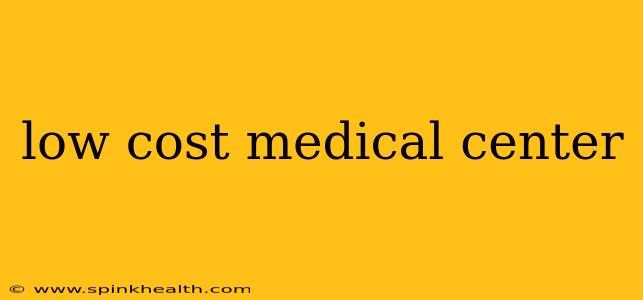The rising cost of healthcare is a significant concern for many, making access to quality medical care a challenge. Finding a low-cost medical center shouldn't feel like navigating a maze. This guide will walk you through the options available, helping you find affordable healthcare without compromising on quality. Let's embark on this journey together.
What are Low-Cost Medical Centers?
Low-cost medical centers, also known as community health centers or free clinics, provide healthcare services to individuals and families with limited incomes or no health insurance. These centers operate on a sliding-fee scale, meaning the cost of services is adjusted based on your ability to pay. Some centers even offer free care for those who qualify. They are a lifeline for many, offering essential medical services without the crippling financial burden of traditional healthcare.
How Can I Find a Low-Cost Medical Center Near Me?
Finding a suitable low-cost medical center begins with a little online research. Imagine this: you're feeling under the weather, and the last thing on your mind is figuring out complicated healthcare systems. That's where online resources come in handy. You can start by searching online using terms like "low-cost medical clinics near me," "free clinics near me," or "community health centers near me." Websites like the Health Resources & Services Administration (HRSA) often maintain directories of federally qualified health centers (FQHCs) in your area. These FQHCs are specifically designed to serve underserved communities and offer affordable care.
Additionally, local health departments and social service organizations are excellent resources. They often have extensive knowledge of local clinics and can connect you with the appropriate services. Think of them as your local healthcare guides.
What Services Do Low-Cost Medical Centers Offer?
The services offered can vary depending on the specific center, but many provide a comprehensive range of care, including:
- Primary Care: Routine check-ups, vaccinations, and management of chronic conditions.
- Preventive Care: Screenings for diseases like diabetes, high blood pressure, and cancer.
- Dental Care: Basic dental services such as cleanings and extractions.
- Mental Health Services: Counseling and therapy for mental health concerns.
- Women's Health Services: Prenatal care, family planning, and well-woman exams.
What is the Difference Between a Free Clinic and a Community Health Center?
This is a common question. While both aim to provide affordable healthcare, there are key differences. Free clinics are often run by volunteers and rely heavily on donations, offering limited services and often operating on a first-come, first-served basis. Community health centers, on the other hand, are federally qualified and receive government funding, allowing them to provide a wider range of services and have more stable operations. They often have a more formal application process to determine eligibility based on income.
Do I Need Insurance to Use a Low-Cost Medical Center?
Not necessarily. Many low-cost medical centers accept patients regardless of their insurance status. However, having some form of insurance, even Medicaid or CHIP, can significantly streamline the process and may cover a portion of the costs. It's always best to inquire about their insurance policies directly.
What is the typical cost of services at a low-cost medical center?
The cost varies greatly depending on your income, the services you need, and the specific clinic. The sliding-fee scale ensures that services remain accessible, even if you have minimal funds. Many times, the cost is significantly less than traditional healthcare providers. It's vital to contact the center directly to understand their pricing structure.
Are low-cost medical centers safe and reliable?
Absolutely! Many low-cost medical centers are accredited and staffed by qualified medical professionals. While the facilities might not always be as luxurious as private practices, the quality of care is often comparable. They maintain high standards for patient safety and treatment.
Finding affordable healthcare is a journey, not a destination. By using the resources and tips outlined in this guide, you can confidently navigate the path towards access to quality and affordable healthcare. Remember to research local options, check eligibility requirements, and don't hesitate to reach out to your local health department or social service agencies for assistance. Your health journey is important, and finding the right path to affordable care is possible.

